Peter MALONE
Saturday, 18 September 2021 19:56
Gifted Hands: The Ben Carson Story
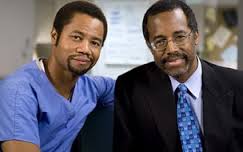
GIFTED HANDS: THE BEN CARSON STORY
US, 2009, 86 minutes, Colour.
Cuba Gooding Jr, Kimberley Elise, Aunjanue Ellis.
Directed by Thomas Carter.
Gifted Hands is the story of Dr Ben Carson, an African- American surgeon who is well respected at Johns Hopkins Hospital and gained an international reputation, especially with his technique for separating Siamese twins joined at the head, a case in the mid-1980s in Germany which he brought to a successful conclusion.
This case gives some drama to the film but most of the story takes the audience back to the 1960s, Ben failing at school, bullied, needing glasses to read properly, getting courage from his mother and teachers, especially her getting her two sons to watch less television and to read. They read voraciously, also acquire great general knowledge and love for classical music. Ben had some moments of rebellion at high school, mixing with the wrong crowd, but eventually went to medical school, met his musician wife, marriage and had a family and progress steadily in school and in his surgical practice.
The film makes much of his stepping in when all surgeons were absent at a conference and bringing difficult surgery to success, taking the risk of losing his licence to practise and praised for taking the initiative in the circumstances.
This is a very substantial role for Cuba Gooding Jr, Oscar-winner for Jerry Maguire, but who has spent a lot of his career making quite a number of straight-to-DVD thrillers. Aunjanue Ellis is very sympathetic as the boy’s mother.
1. A true story? An edifying and hope-filled story?
2. The 1960s to the 21st century? African Americans in American society? The civil rights era? Education, opportunities? The possibility for anyone to do anything – but better?
3. Ben Carson, his family background, disabilities at school, the encouragement of his mother, reading, his brother and television quizzes, gathering information? High school, college, medical studies, internships, opportunities for surgery and for his gifted hands? Rise, reputation? Achievement? An example for others?
4. The opening, the situation in Germany, the Siamese twins, joined at the head? The distraught parents? The focus on the twins, lying in bed, joined, their being fed? The request to Dr Carson, his going to Germany, prognosis, what was available in the mid-1980s?
5. The film leaving the 1980s situation and going back to Ben’s childhood?
6. The two boys, their ages, Ben at school, failing in exams, ridiculed by the others, urged on by his mother, his brother? His having to get glasses? reading better? Improving with the tests, the encouragement of the teacher? His mother, her hard work, tired?
7. The mother going to the doctor, her mental condition, the story of her husband with the other family, the separation, bringing up the children as a single mother? The need to go to the institution, entrusting the boys to care, her time away, her improving health? Her getting the job with the professor, the library, the admiration for books, the professor teaching her to read?
8. Her encouraging her sons to read, to watch less television? The impact of the reading? Ben and his information about rocks and stones, the encouragement of the teacher? The quizzes, general information? The need to know more about art and music? Love for classical music? Ben and his desire to be a doctor?
9. Going to school, mixing with the wrong group, tough, becoming rebellious, angry with his mother, his temper?
10. Going to medical school, his future wife, the violin, love of music? His confidence, yet his diffidence?
11. Becoming a doctor, the interview with the doctor, the love of music, his being accepted, his critical stances? The staff at the hospital? The situation, the man bleeding, no doctors available, his taking the risk, performing the operation – and the admiration of the supervising doctor and commending him for his initiative?
12. The years passing, his expertise, his gifted hands? The support of his wife? His children? His mother?
13. Studying the situation in Germany, trying to find a solution, the nature of the bleeding, the suggestion of stopping the heart for an hour, disconnecting the heads?
14. The tension of the operation, over 24 hours, the detail, the surgery, the precision of the team, so many people in the surgery? The success? The gratitude of the parents?
15. A heartwarming story, and encouraging story?
Published in Movie Reviews
Published in
Movie Reviews
Tagged under
Saturday, 18 September 2021 19:56
Tom and Huck
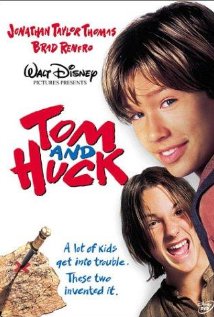
TOM AND HUCK
US, 1995, 90 minutes, Colour.
Jonathan Taylor Thomas, Brad Renfro, Eric Schweiz, Charles Rockett, Amy, Rachel Leigh Cook, Michael Mc Shane, Marian Seldes.
Directed by Peter Hewitt.
Disney had a popular success with its 1993 The Adventures of Huckleberry Finn, with Elijah Wood in the central role. The film had a very strong cast with Jason Robards and Robbie Coltrane as the King and the Duke, with Ron Perlman as Huck’s father.
That film was written and directed by Stephen Sommers who co-wrote this version of The Adventures of Tom Sawyer, Mark Twain’s companion story to Huckleberry Finn. In fact, Huck is a strong character in this film, along with Jonathan Taylor Thomas as Tom.
The film is set in the 1840s along the Mississippi River, Tom and his friends wanting to run away from home but returning, Tom looked after by his Aunt Polly. He has great admiration for Huckleberry Finn who travels the river and lives out of town.
The central action concerns a killing in the cemetery for which the drunken Muff Potter is arrested while Tom has witnessed the killing and knows that the murderer is Injun Joe. Tom tells the truth in court, Joe throws a knife at him but it is stopped by the Bible. In an eerie scene, Tom and Becky Thatcher are lost in the caves at the picnic ground and are pursued by Joe, with Huck coming to the rescue. In the 1938 version, this sequence was particularly frightening for children – and, with the killing in the cemetery, the throwing of the knife, and the fight and confrontation in the caves, this presentation might be frightening for children.
British director, Peter Hewitt, made a number of films for younger audiences, Bill and Ted’s Bogus Journey, The Borrowers, Thunderpants, Garfield.
1. The popularity of Mark Twain’s stories? Tom Sawyer? Huckleberry Finn?
2. Disney film, bringing the classic to the screen, family friendly?
3. The Mississippi, the river, the town, homes, the court? The surroundings, the picnic, the cave, the interiors? The atmosphere of the 1840s? The musical score?
4. Tom Sawyer’s story? His friends and their running away from home, the raft crashing into the rocks, overturned? Huck rescuing Tom and reviving him? Tom and his friendship with Huck, Huck older, the background of his father, the Widow Douglas, travelling up and down the river, being free? His living outside the town? Tom’s visit? The friendship between the two?
5. The doctor, summoning the Injun Joe, the money for digging the grave, the treasure? Muff and his drinking, friendship with the boys? Joe and the murder? The arrest of Muff, Tom as the witness, Joe and his threats, the knife?
6. Tom at home, Sid, the jokes, Aunt Polly? Becky Thatcher? Strong stances towards Tom?
7. The court case, Tom and what to do, the fear of Joe? The prosecutor, condemning Muff? The defence lawyer with nothing to say? The Widow Douglas challenging him? The role of the Judge?
8. Tom and his decision to tell the truth, Joe throwing the knife, caught by the Bible? His escape? Joe killing his accomplice? The threat to Tom? Huck and his return, the nature of friendship?
9. The picnic, Tom and Becky in the cave, the threat from Joe, the fight, the knife, the treasure, how to the rescue? The fight and Joe falling down the well? The coins?
10. Life resuming as normal for Tom? Huck in his special clothes, change of life, going to school, with the widow Douglas?
11. How satisfying drama of Mark Twain’s story?
Published in Movie Reviews
Published in
Movie Reviews
Tagged under
Saturday, 18 September 2021 19:56
Dark Skies
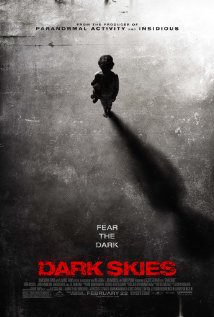
DARK SKIES
US, 2014, 97 minutes, Colour.
Kerry Russell, Josh Hamilton, Dakota Goya, Kadan Rockett, J.K.Simmons.
Directed by Scott Stewart.
Dark Skies has an ominous-toned title. The film opens with an ordinary family and audiences identifying with them, the father during an interview for a new job, the mother selling real estate, two boys at home.
Gradually, strange things happen, unexplained mess in the kitchen, a building block of photos, the younger son outside. The police are sceptical, the father instals surveillance screens but falls asleep and misses out on some time, as does his wife while she is trying to sell the house. The younger son has strange catatonic experiences. Then, three flocks of birds crash into the house and the windows.
While researching the phenomena, the wife discovers an expert, played in a rather subdued and persuasive manner by J.K. Simmons. The film then turns from mystery with touches of horror into an alien, bodysnatching film, rather more restrained than gory and available to a wider range of audience.
The director is Scott Stewart, director of the post apocalyptic films Legion and Priest, both with Paul Bettany.
1. The title, ominous? From clear skies to stormy and alien attack?
2. The family story, ordinary, leading to mystery, horror, aliens? The plausibility of the plot?
3. An ordinary family, the home, the kids, friends? Daniel and the job application, feeling that he had failed? Later getting it? Lacy and her real estate work, showing the houses to clients? Audiences identifying with the parents and their family situation?
4. Lacy, her age, the marriage, love for her husband, love for the boys, Jesse’s past illness, getting healthier? The concern about Sam, being bullied? Tension? Her job, liking it, and kindly to prospective clients?
5. Jesse and Sam, their ages, supporting each other, the horror stories, Sam’s dreams, the communication from room to room? Bonding with their parents, Jesse, his friend, the sex videos, some anger towards his parents? Sam, dependent? The young girl, at the party, her looking at Jesse, support? Sam and the football, his behaviour, the reaction?
6. The strange phenomena in the house, the mess in the kitchen, the building blocks with the photos? The new security, discussions with the police, no one entering the house? Sam outside? The odd behaviour, discussions about sleepwalking and sleep-eating?
7. Lacy, her anxiety, the house, being with the clients, her sudden breakdown, waking, the lost hours, her being told to go on leave? A growing concern?
8. Daniel, the itch behind his ear, getting the security installed, the discussions with the police, his watching the screens, the distorted screens, sleeping, the lost time? Finding Sam outside?
9. Going to the doctor, advice, the theories about the phenomena? Sam and the stripes on his back, the friend confronting Lacy? On Jesse’s back? The threat, the visitor and the discussions, her phone call? Child protection?
10. The birds crashing into the house, the supervisor, the news that there were three different flocks of birds?
11. Lacy googling, finding similar incidents, discovering the expert, going to see him in person, his home, his appearance, his hat, his questions for the interview, explaining situations to them?
12. The aliens, studying humans, the inserts into people, illnesses, behaviour, weaknesses and threats?
13. Protecting the house, boarding up the windows? Jesse and his annoyance, his leaving, the girl urging him back? The return, the protection of the dog,
the gun? The drawings, the aliens, reality, seeing the aliens come into the house, the attack, the light?
14. Jesse being taken? The three months passing, Sam and the contact with his brother? They’re accepting the reality?
15. A rather low key alien horror story, accessible to a wider audience – but appealing to ordinary families, ordinary characters, and yet their being singled out for alien observation?
Published in Movie Reviews
Published in
Movie Reviews
Tagged under
Saturday, 18 September 2021 19:56
Good Lie, The
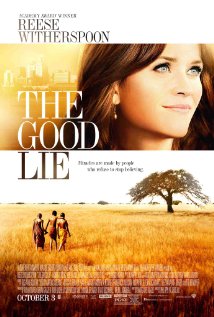
THE GOOD LIE
US, 2014, 110 minutes, Colour.
Reese Witherspoon, Arnold Oceng, Ger Duany, Emmanuel Jal, Kuoth Wiel, Corey Stoll.
Directed by Philippe Falardeau.
The Good Lie did not receive much cinema exhibition, but became available on DVD. It is the kind of film that could be recommended to serious audiences, especially those with a concern for justice, and those who are interested in the turmoil in African countries, especially sub-Sahara countries like Sudan.
The meaning of the title? At some stage, some of the characters feel the need to tell some untruths in order to achieve a greater good.
While Reese Witherspoon gets prominent billing, she does not appear in the early part of the film, so is on posters for marketing purposes, as well as for her interest in being in this film and promoting it.
In fact, the first half of the film takes place in the South of Sudan, in the underprivileged area which became in recent years the new country of South Sudan. In the 1980s, there were many raids on villages by militant groups, nicknamed “the devils on horseback”. A great number of people were killed and many fled. Perhaps, the story of the “lost boys” is known to some audiences, the group of boys who were urged to leave their villages, leaving behind their families and loved ones, and trekking thousands of kilometres from Sudan to Kenya. When they arrived in that country, they were put into refugee camps, remaining there for several years, many of them growing up into adulthood in the camps.
The drama early in the film is that of the attacks of the militants on horseback, the cruelty and viciousness, the killings, and the long walk by the children, not all surviving, but helping one another to move further away from their dangerous country.
The second part of the film shows us some of the boys, now adults, and the possibilities of their being transferred to other countries – not possible for everyone, some spending many more years interned in the camps. But, many were fortunate enough to be able to go to the United States or countries like Australia, refuges for political refugees.
While the boys learn to speak English in Kenya, they were not educated in the ways of the world, let alone the ways of an affluent first world nation like the United States. We follow a group of them as they are transferred to Kansas City, Missouri, with bureaucrats bungling the transfer and separating one of the men from his sister who is sent on to Boston. Reese Witherspoon plays one of the contacts, herself not particularly well-prepared to understand the young men from Africa, but making efforts to get them accommodation and to get jobs.
The younger men themselves have varied experiences in their work, some of them being pressed into joining groups, something the equivalent of gangs. Others get steady jobs. One enterprising young man devotes himself to study, improving himself, with the hope of training to be a doctor.
The Good Lie could be something of an eye-opening film for those who have not had contact with refugees, who are not aware of how important cultural differences are, or the strain of the newcomers in their learning of a new language, getting used to manners, different food, expectations in the workplace…
To that extent, the film is interesting, entertaining in its way – and a good way of enabling its audiences to have their horizons widened.
The film was directed by Canadian director, Philippe Falardeau, who treated something of the same themes in a French-Canadian? setting, with a teacher who came from northern Africa, Monsieur Lazar, which is also a very fine film.
1. The title? Lies? Allowable for a good and moral result? As illustrated in this film?
2. South Sudan in the 1980s, the military, the massacres, the villages, the walks of the refugees, through the desert, the camps in Kenya, migration to the US? Adapting to American life?
3. The cast, refugees, former child soldiers? The American cast?
4. The Sudan story, applicable to world situations, terrorism, tribal massacres, military, Africa?
5. The contrast between Africa and the affluent American lifestyle, Kansas City, Missouri?
6. The title of the Lost Boys, going to America, not lost, their achievements within the US?
7. The children in the village, their culture, playing together, the attacks, the death of the father, the children, the mother? Theo and his brothers, Theo as the chief after his father’s death, the loyalties of the others? His leadership? The device of remembering the names of their ancestors – and later as the means for the authentic identification of Theo?
8. The trek, going to Ethiopia, hardships and the desert, the tigers, drinking the urine? A sense of brotherhood and sisterhood? Meeting the group, turning back from Ethiopian, going to Kenya? The river and the many deaths, their crossing, fears, the young boy dying, the soldiers pursuing, Theo sacrificing himself for the others?
9. The camp in Kenya, the thousands, 13 years in the camp, the children and the receiving of aid, the aid workers? That life, transition to adults, the English-language, rather formal and polite? Their hopes? On the list to go to America?
10. The indications that there was little preparation for that life in America, customs, food…? In the plane, the puzzle about the meals? Arriving, the woman being late, the courtesy language to Carrie? Their not wanting to tell lies? The concern about their sister being transferred to Boston and their inability to help, Mamere and his sense of responsibility?
11. Carrie, late, with her friend? At the airport, meeting the men, awkwardness? Illustrating American lack of awareness of culture, customs and the need for adaptation? Leaving them at the door, showing them the flat?
12. The three in the house, the charity worker and her support? Beds, food, thinking the phone was an alarm? Late for the interviews? Jeremiah and the job application, his skill with tools? Their wanting him to be working on a team, slower work, offering the drugs? The effect on him, sense of loss, not coming home? Phoning his sister, his anger, the police, the others getting him out? The fight with Mamere? The reconciliation and apology?
13. Mamere, clever, wanting to be a doctor, stacking the goods, going to classes, his answers about Huckleberry Finn? Concern about the others, especially Jeremiah?
14. Paul, finding a place in the church, at home there, his jobs, finally leading the prayer?
15. The tensions, the effect on them, opportunities and lost opportunities?
16. Carrie, a friend, arranging for the interviews, testing their capabilities, looking for opportunities? His cattle and their being at home with the cattle?
17. The situation with her sister, Carrie going to immigration, the official helping, advice? Jack and his willingness to supply finance? Carrie, moved by the men, learning from them, listening to them? Getting them out of trouble? The charity worker, the clean-up of her apartment, offering it for their sister? Her arrival, more sophisticated than the men, happy to be with them?
18. The message from Theo, Mamere and his decision to return, the old friend in the camp, finding Theo? The test with the names of the grandfathers? Going to the embassies, unwilling to help? Going to the airport, Mamere giving Theo his passport, Theo going through, arriving in America? Mamere and his staying, offering to work in the camp, gratitude for his life being saved by Theo?
19. A significant film about Africans, violence and massacres, displacement, the refugee camps – and the possibilities of affluent countries offering assistance?
Published in Movie Reviews
Published in
Movie Reviews
Tagged under
Saturday, 18 September 2021 19:56
Town That Dreaded Sundown, The/ 2014
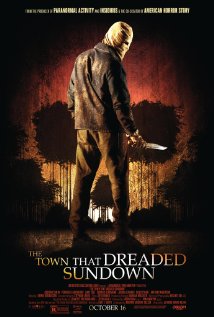
THE TOWN DREADED SUNDOWN
US, 2014, 86 minutes, Colour.
Addison Timlin, Veronica Cartwright, Anthony Anderson, Travis Tope, Joshua Leonard, Gary Cole, Edward Herrmann, Ed Lauter, Denis O' Hare, Spencer Treat Clark.
Directed by Alfonso Gomez- Rejon.
The Town that Dreaded Sundown was an independent film, with touches of horror, by the celebrated director Charles B. Pierce. This film is something of a remake as well as a sequel.
While the screenwriter, Roberto Aguirre- Sacasa, utilises the original screenplay by Earl Smith, the original film is also incorporated into the screenplay. This is an interesting device of having a film within a film.
The killings in Texarkana, on the border of Texas and Arkansas, took place in 1946 and have stayed in the memory of the townspeople. After the release of the film in 1977, it is screened annually on the anniversary of the murders at the local drive-in. The film also has the device of the film director’s son living in the town, being interviewed, having memorabilia, talking about his father, and offering a solution to the identity of the killer.
Much of the rest of the film is showing the victims of the killer, young couples and sexual encounters, a soldier returning to his girlfriend, two gay teenagers, the deputy sheriff…
The heroine is Jami, Addison Timlin, who escapes from the first encounter and decides to investigate the past – while people are being killed in the present.
There are some veterans in the cast including Veronica Cartwright as the grandmother, Ed Lauter as the sheriff, Gary Cole as the deputy and Edward Herrmann as a rabble rousing preacher.
As a film about a serial killer, the film works quite well – both with the added emphasis of the impact of the film and its effect on Texarkana citizens.
1. The original film of 1977? Its being shown in the town of Texarkana on the anniversary of the killings? The excerpts from the original film? At the drive-in? Throughout the film? Mirroring the contemporary events? The device of having the son of the director being a character, discussing his father’s film, offering a theory about the murderer’s identity?
2. The film as something of a sequel, copycat killings, the effect on the town, the town’s consciousness about the killings in 1946? The Phantom Killer? The sinister mask? The mysterious identity and motivation?
3. The glimpses of Texarkana in the 1940s? On the border of Texas and Arkansas? The captions indicating the nature of the Bordertown, different authorities, different responsibilities, two of each because of the two states? The memory of the killings, the myths?
4. The role of the Rev, his sermons, rallying people, the denunciations of sexual misconduct? Suspicions of him? The issue of his sending the aggressive email? Interrogation? Arrest?
5. The focus on Jami, with Corey, not wanting to watch the film at the drive-in, leaving, making out, the approach of the killer, the death of Corey, the attack on Jami?
6. The local police, the sheriff, the deputy and his seeming indifference (at interrogations, the sexual encounter and his being shot in the eye)? Deputy Foster and his reassuring Jami?
7. Jami, prospect of university, living with her grandmother, her grandmother’s memories, supporting her granddaughter? The decision to leave, and the unexpected killing of the grandmother?
8. Jami and her investigations, research, articles, questioning people? Nick and his interest in her, his advance and her reaction? Later being with him? His being killed?
9. The range of victims, paralleling the chronology and the kind of victims of the original killer, and of the film? Couples, the boys tortured, the women harassed and killed, the two gay teenagers, the man returning from military service and his girlfriend? The death of the deputy sheriff?
10. Jami, the information about the film director’s son, his having been seen in the bar, going to meet him, interview him, his memorabilia, his theory about the final victim, his son and his obsession, the possibility of being the murderer?
11. Jami, leaving town, at the service station, the death of her grandmother, the death of the attendant? Suddenly seeing that there were two killers? Their attack, her pulling off the mask, the revelation of Corey, his having pretended to be killed – and the scene of his funeral and his distraught mother attacking Jami? His motivation, wanting to be noticed, to be famous? The connection with the last victim and his vengeful son? The revelation that the other killer was Foster, his motivation, joining with Corey?
12. Jami, the deaths of the two men, the solution of the mystery?
13. The cleverness in the plot, having a remake, having a sequel, and the film within a film?
Published in Movie Reviews
Published in
Movie Reviews
Tagged under
Saturday, 18 September 2021 19:56
Collector, The/ 2009
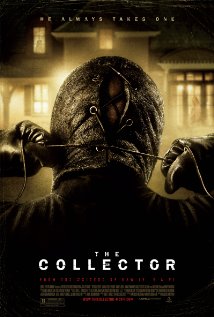
THE COLLECTOR
US, 2009, 90 minutes, Colour.
Josh Stewart, Michael Reilly Burke, Andrea Roth, Juan Fernández.
Directed by Marcus Dunstan.
At one stage, The Collector was pitched as a prequel to the Saw series. The director, Marcus Dunstan, contributed to the screenplays of Saw IV, V, VI, Saw 3D. However, the offer was not taken up.
This film was produced after the Saw series ended. And it was followed by Marcus Dunstan’s The Collection, a sequel to this film, a re-run of the basic plot.
The film is very much in the vein of what has been described as “Torture Porn”. In fact, it is a very ugly and ugly-looking film which will appeal only to devotees of this kind of gory horror. The tone is set during the rather luridly-coloured credits with sinister visuals of torture, instruments, spiders…
The film starts ordinarily enough with workers on a building site, one of them, Arkin (Josh Stewart) helping the owners by fixing difficult door and sitting down with the little daughter at her invitation to have pretend-tea-party. He is given a bonus by the owner.
There is a complication where Arkin has to find enough money by midnight to pay his wife’s debts. He has a daughter whom he loves, and tries to manage the tension with his wife. He makes contact with some criminals and offers them a plan to rob the mansion, the owner being a jewellery broker, and use his skills to open the safe. He has had a past connection with these criminals in prison.
Once inside the house in attempting to do the robbery, thinking that the family are away on holiday, he discovers that there is someone else in the house. Not only that, the whole mansion has been very deliberately set up with booby traps of the most vicious and violent type. The husband and wife have been tortured, their teenage daughter is missing, the little girl is hiding. Arkin then becomes something of a hero, trying to rescue everyone – with some temporary successful results, but then in conflict with the masked intruder, The Collector, and people being viciously killed. Arkin himself becomes the victim of some of the booby traps but is able to get free.
Ultimately, there is a confrontation with The Collector, a violent fight, police arriving and being killed, Arkin taken away in an ambulance only to find The Collector overturning it.
There is as mysterious box in the house at the beginning of the film, a mysterious old man who says that he is the bait. It seems that The Collector collects bodies – but there is no real explanation of who he is and why he is acting like this. The whole film is a rather exploitative exercise in blood and gore, which only fans of this kind of horror would be interested in sitting through.
Published in Movie Reviews
Published in
Movie Reviews
Tagged under
Saturday, 18 September 2021 19:56
Mante Religieuse, La/ Maneater
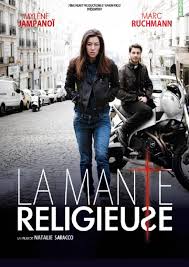
LA MANTE RELIGIEUSE/ MANEATER
France, 2012, 85 minutes,. Colour.
Mylene Jampanoi, Marc Ruchmann, Genevieve Casile.
Directed by Natalie Saracco.
The original title was La Mante Religeuse (2012, director Natalie Surocco), perhaps something of a play on words, praying mantis, praying mantis.
The film is a portrait of the young bisexual artist in a lesbian relationship, with the obviously symbolic name, Jezebel. When she attends her father’s funeral, dressed provocatively to her mother’s disapproval, she finds father David who conducts the funeral and attractive man. She tells her friend that she will seducing and take his Roman, as a souvenir. She phones him, pretends to have a friend who wants to be baptised, agrees to become part of the choir after she goes to mass, keeps up the pretence in a brazen kind of way.
The priest is an interesting character. He is in his 30s, tall and good-looking, bearded, smoking, yet with sympathetic words at the funeral, a good religious language. He talks like a priest. However, in his talk about his relationship with God, about his sense of vocation, his dialogue is rather text bookish in the sense that it has a kind of abstract piety and earnestness rather than being grounded in sound psychological self-awareness.
He speaks sympathetically to Jezebel who listens to his sermon on Mary Magdalen, his thinking that she was troubled by some Demons, not kind to herself and, maybe, she has the sole of St.
One of the interesting features of the film is that shows, to a large extent, father David in his pastoral work, his outreach to the poor, to people on the street, collecting clothes and distributing them, contact with the hungry. When Jezebel accompanies him, she becomes somewhat confused, not having thought about him in ministry and the good that he was doing.
When she reveals the truth to him and says she is sold to be saved, she told him about his masculinity, about his sexuality. the film shows him praying, and earnestly. She perseveres, collapses in the church, stays overnight in the presbytery – he asking her to respect the church and she replying that he was gorgeous when he was angry. “man’s madness, God’s vision”.
The surprising sequence has David going to visit the Carmelite monastery in Normandy where he goes to pray. Jezebel pressure rises the acolyte of the parish, a man formerly down and out but saved by David, standing, Stand, who warns off Jezebel saying that while David saved him, he wants to save David. The Carmelite sisters are particularly welcoming of Jezebel, especially the superior who shows great kindness and listens to her. at the superior appreciates the situation but it is sympathetic in trying to help Jezebel.
David explains his vocation to Jezebel, that he used to play mass in the cellar when he was a little boy, that he fell in love with God, God is an absolute, that he really loves God and wants to be as one with him. He explains that stand was the first of the lost sheep that he was able to help.
Jezebel continues to pressurise him, and he becomes desperate, praying more intensely, taunted by her that he doesn’t know how to love. David asked God not to give up on him, to deliver him from that woman, her red hot thoughts, “the smell that I carry in my blood, the eyes that I obey, the words from her mouth”.
Then David, in desperation, does visit jail Jezebel in her studio, he says he can no longer pray, that she is the kind of woman that has been dreading all his life. .He begins a passionate encounter with her but comes to his senses, sees her crucifix, stocks, whips, hit his head against the wall, leave saying that he never wants to see her again.
In many ways, the screenplay takes the easy way out, David writing on his bike, speaking as he always did, a close-up on his face which shows a kind of joy and peace just before he crashes. The ending of the film is not without grace is Jezebel, shocked, goes to visit the Carmelite’s where she is received by the superior.
This is a film from France, with a French sensibility about the church, about priests and their ministry, about clerical celibacy. What might have been exploitative, finishes as a quite insightful drama.
1. The title? The praying, preying mantis? The English title, Maneater? Expectations?
2. France, the city, the artist’s studio, the loft, art shows, church, funerals, presbytery? Relationships? The priest and his charitable works? The church? The Carmelite convent in Normandy and its austerity, chapel?
3. The portrait of Jezebel, her symbolic name, in action? Lesbian, bisexual behaviour, her partner, the tensions between them, love, exploitation? Her flaunting her attitudes? Going to the funeral, the criticisms of her mother, her inappropriate dress, talking to the priest, attracted to him, her stated aim of seduction? His Roman collar as a souvenir?
4. Father David, young, kind, his manner at the funeral, the eulogy, his prayers? Becoming Jezebel’s target? Her talk, phone calls, visits, going to Mass, discussions about the choir, the choir mistress and her condemnation, her not singing well, leaving the choir? Father David and his sermon on Mary Magdalene? The Mary Magdalene theme and forgiveness?
5. David, his activities, the range of charities, on the street, the poor, distributing the clothes, the hungry?
6. Jezebel going with him, the effect on her, surprise and his outreach?
7. Jezebel and her effect on David, doing good, his cautions, his kneeling and praying? His devotion and pious language about himself, about God, about his vocation?
8. His going to the Carmelite’s, Jezebel and her discussions with Stan, Stan’s warning Jezebel off, his being saved by David, wanting to save him, Jezebel and the Carmelites, the nun receiving, the superior and the talk, David and his unwillingness, staying the night?
9. The art auction, the printing, the people gathered? Her accusation that Stan stole the money, David believing her, the friends falling out?
10. The portrait of the nuns, the contemplative style, friendship, welcome, the religious exercises, David at home at the convent? The effect on Jezebel?
11. Jezebel, telling David the truth, his dilemma, his passion, going to visit Jezebel, the beginnings of the sexual encounter, intense, his coming to his senses, leaving, on the motorbike, the close-up of his face, the crash? The later comments on his speeding?
12. The effect on Jezebel, going to the convent, being received by the superior?
13. An interesting portrait of the priest, of a predatory woman, the realities of clerical celibacy?
Published in Movie Reviews
Published in
Movie Reviews
Tagged under
Saturday, 18 September 2021 19:56
Jiminy Glick in Lalawood
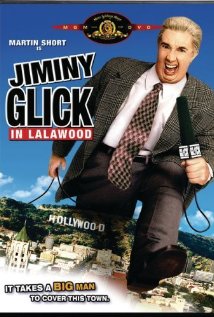
JIMINY GLICK IN LALAWOOD
US, 2004, 90 minutes, Colour.
Martin Short, Jan Hooks, Linda Cardelini, Janeane Garofalo, John Michael Higgins, Elizabeth Perkins, Corey Pearson, Gary Anthony Williams. Interviews: Kiefer Sutherland, Whoopi Goldberg, Kevin Kline, Pat O'Brien, Sharon Stone, Jake Gylenhaal, Forrest Whitaker, Susan Sarandon, Kurt Russell, Rob Lowe, Steve Martin. Cameos by Emmanuelle Beart, Willem Dafoe, Roger Ebert, Chloe Savigny.
Directed by Vadim Jean.
Comedian Martin Short created a character for a television series, Jiminy Glick. Glick was a television personality from Beaut, Montana, an eccentric personality, decked out in a fat suit reminding audiences of Fat Bastard from the Austen Powers films. He had a boisterous tone, with a voice that registered on several levels. He thinks himself very important – but is not the brightest star in the firmament.
The television series went to several seasons. This is a feature length version of Jiminy Glick.
We are shown him interviewing one of the local stars and then receiving the news that he is to go to the Toronto Film Festival. He takes his wife, Dixie (Jan Hooks) and his two rather large twin sons. This gives him the opportunity to see several of the movie stars on the red carpet where he is largely ignored and then finds himself relegated to a minor hotel and his agent reveals that her main work has been in a video store.
He sleeps through the premiere of a film about Gandhi, with a sendup of the producer introducing the film and introducing the rather dopey star being rather incoherent. The film is a critical failure except for Glick’s review which means that that the producer and the star agree to give him an interview, and Glick becomes a great sensation, people lining up to be interviewed – with a host of very entertaining cameos with such stars as Kiefer Sutherland, Kevin Kline, a long interview, with humorous sexual innuendo, with his friends Steve Martin, and Kurt Russell collapsing in laughter. Other stars are glimpsed throughout.
There is a subplot where Glick thinks he has murdered the star of a lesbian drama, the African Queens. She is played by Elizabeth Perkins and her daughter by Linda Cardelini. Their producer is tour-de-force performance from John Michael Higgins (Best in Show, A Mighty Wind and the commentator in the Pitch Perfect films). He improvises in a manic way as an arrogant Scandinavian producer.
The murder is solved – and is given parallels with Lana Turner’s experience with her daughter and the death of her lover, Johnny Stampanato.
But the main tour-de-force is the David Lynch introduction to the film, his look, manner, cigarette, intonation, reference to his films, the visuals of Lost Highway, and his solving the mystery – a wonderful impersonation by Martin Short himself.
The film was directed by Vadim Jean, a British director who had made Leon, the Pig Farmer.
1. Spoof comedy? Hollywood? Films, festivals, stars, producers? Critics and TV personalities? The allusions to many films, the corridors in The Shining…?
2. Martin Short, his character, the television series, full-length film? His writing, the jokes, blunt assertions? His wife, sexual relationships? His twin sons? The humour?
3. Butte, Montana, television, homes, Dixie, the twins, the local stars and interviews?
4. Jiminy and his type of interview, boisterous, manner, voice range? Going to Toronto, starstruck? Kiefer Sutherland and calling out: Kiefer, Kiefer, Kiefer, Kiefer? The glimpses of stars? Going to the wrong hotel, downgraded, the staff, the room? His agent, her background in a video store, diffident, wanting to get interviews?
5. David Lynch, the introduction, the Lost Highway, the impersonation, the sendup, his look, manner, hair, cigarette, seriousness? Continuing throughout the film?
6. The Premiere, Jiminy sleeping? The producer and his introduction, the star and his inane comments? The parody of Gandhi? The bad reception for the film? The poor reviews? Jiminy deciding he liked it, the producer and the star reading his review, contact with the agent, the interview with the star after his refusing for years? The acclaim for Jiminy and his getting the exclusive?
7. Miranda Coolidge, Andre Devine? Miranda’s daughter? Her drinking? The interactions with the producer? His European background, his arrogance and disdain, John Michael Higgins and his improvising? The comedy? The Lesbian film, the joke on the African Queen, the scenes, the parody? The acclaim?
8. The interview with the star, getting on everybody’s list, the agent and her being happy?
9. Jiminy, crass, his faux pas, relationship with his wife, the sex? His dream about Miranda, her death? Dixie and her slapping her husband?
10. David Lynch, in the hotel, at the bar, his explanations of what happened?
11. The situation, the background of Lana Turner and Johnny Stampanato, the murder? The parallel with Miranda and her daughter?
12. The daughter, the relationship with the agent? Her mother’s reaction? The knife, the stabbing, dealing with the body?
13. Everybody gathered, the explanation?
14. Jiminy, success, audience response to TV personalities, the hype, their idiotic comments and behaviour?
15. The poking fun at filmmakers, audiences, fans and reviewers?
Published in Movie Reviews
Published in
Movie Reviews
Tagged under
Saturday, 18 September 2021 19:56
Ma Saison Prefere/ My Favourite Season
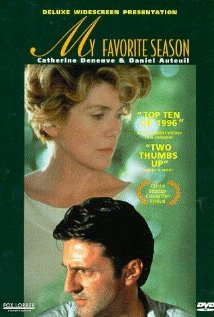
MA SAISON PREFERE/ MY FAVOURITE SEASON
France, 1993, 127 minutes, Colour.
Catherine Deneuve, Daniel Auteuil, Marthe Villalonga, Jean- Pierre Bouvier, Chiara Mastroianni, Carmen Chaplin, Anthony Prada.
Directed by Andre Techine.
My Favourite Season was written and directed by Andre Techine. He has a very strong reputation with dramas with a French sensibility, Girl on a Train, Wild Reeds, I Don’t Kiss, the war drama, Strayed, and the biography The Bronte Sisters.
This is a film about family, focusing on a 50-year-old woman, played by Catharine Deneuve, who has to move her ailing mother from an institution, bringing her home, her husband reluctant to have his mother-in-law, and her daughter (played by Deneuve’s own daughter, Chiara Mastroianni) and adopted son, part of the issues. She goes to visit her estranged brother, Daniel Auteuil, an erratic and edgy surgeon who comes home, interacts with his mother, agrees with her to move out from her daughter’s but fails to detect her medical condition and she dies.
The film gives the opportunity for the characters to discuss their interactions, relationships, their estrangements – including using that French device in so many dramas, the family meal.
There are some kind of move towards resolution at the end – once again with discussion and Emile. And each of the characters describing their favourite season.
Similar to many films of its kind – but well acted and thoughtful.
1. A portrait of a French family, relationships, tensions? The very French sensibility?
2. The delineation of chapters, the progress of the story?
3. Locations, homes, workplaces, meetings, funerals? The musical score?
4. The title, the final sequence, the response of each of the characters and their choices for their seasons?
5. Emilie as focus, her relationship with Bruno, the years of marriage, their daughter, adopted son? Each in their profession? Tensions, her control? The law? Her age and experience, relationship with her daughter, with her son? Her relationship with her mother, the tensions, the mother’s physical state, helping her, taking her home, her husband’s reaction, setting her up in the room, her mother talking to herself, unhappy? Trying to cope?
6. Emilie, going to see Antoine, three years absence, his life, manner, surgeon, fussy? His work and edgy? The animosity towards his sister? his relationship with his mother, her favouring him? Leading to jealousies?
7. The daughter, at home, relationship with her parents, her skill at the piano? Lucien, Antoine discovering him in bed with his girlfriend? His place at the table, critique?
8. The French device of showing meal situations, everybody present, the arguments, the consequences?
9. The mother, from the land, unable to read and write, the ambitions of her husband? Her relationship with her children? Her suffering turns, in the home, leaving with her daughter? Dissatisfied at home? The meal, with Antoine, going with him? Her having a further turn, Antoine not recognising it? Her death, funeral?
10. The aftermath of the funeral, people speaking to each other, Bruno and the separation, talking to Emilie, her response? Antoine? The children?
11. The film taking audiences inside relationships? The open ending?
Published in Movie Reviews
Published in
Movie Reviews
Tagged under
Saturday, 18 September 2021 19:56
Adventures of Huck Finn, The
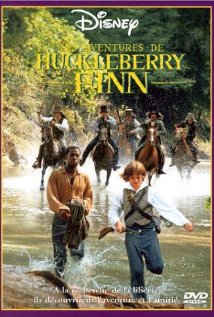
THE ADVENTURES OF HUCK FINN
US, 1993, 108 minutes, Colour.
Elijah Wood, Courteney B.Vance, Robbie Coltrane, Jason Robards, Ron Perlman, Dana Ivey, Anne Heche, James Gammon, Tom Aldredge, Curtis Armstrong, Frances Conroy.
Directed by Stephen Sommers.
There have been several cinema adaptations of Mark Twain’s story, The Adventures of Huckleberry Finn. One of the most notable was that of the 1930s with Mickey Rooney, very much at home in the central role. There was a musical version with Jeff East in the 1970s.
This is a film of the 1990s, given the lavish Disney Studios treatment, with a very strong cast of character actors and Elijah Wood, in one of his earliest roles, showing his great acting talent in the role of Huck Finn. He was to make a number of films during the 1990s, showing talent, for example The Good Son, with Macauley Culkin. While he was to appear in quite a number of films and the television series, Wilfred, he made his mark as Frodo in the The Lord of the Rings cycle.
The film sets the scene on the Mississippi in the 1830s, society, poverty among whites, and the slavery of the blacks. Courteney B.Vance is sympathetic as the slave, Jim, wanting his freedom and accompanying Huck on his adventures. Ron Perlman plays Huck’s hikes father, a threatening and abusive man.
As with the other film versions, the two rogues, the King and the Duke, team up with Huck and Jim, pretending to be the brothers of a dead man, intending to rob the dead man’s nieces of their fortune and sell their house. They are played with a rollicking enthusiasm by Jason Robards and Robbie Coltrane. It also gives the opportunity for Elijah Wood to show his talent, pretending to be their valet, and toying with British accent and style.
In the Disney context, the film shows a great deal about slaves, the prevailing attitudes of the time, even Huck talking down to Jim in various crises. There is happy ending, Huck reinstated, Jim given his freedom, and an enjoyable experience of Twain’s story.
1. The popularity of Mark Twain’s story? The 19th century is? The popularity of the characters, especially of Huckleberry Finn?
2. 1990s version, Disney, colourful, locations, characters, serious, comic? In comparison with previous versions?
3. The 1830s, the American South, the town, homes, slaves, in the fields, in homes? Slavery taken for granted? The criticisms of slavery?
4. The river, the river boats, the sequences on the river, the river’s importance?
5. Elijah Wood as Huckleberry Finn, his talent as a little boy actor? His background, his absent father, his father’s return, mockery and threats? The news of his death? Huck and the two sisters, their looking after him, fussing about him? His friendship with Jim? His friendship with the boys, the glimpse of Tom Sawyer? The fights and Huck being roughed up?
6. The aftermath with his father, his deciding to go? The plan with Jim? Escaping with Jim, Jim accused of murder? His being hunted?
7. Huck and Jim on the water, their encounters, sailing past their destination, the return?
8. Jim, as a slave, his background, his family, wanting freedom? Good to Huck? Yet Huck and his sometimes haughty reactions, Jim is a slave?
9. The encounter with the King and the Duke? The characters, rogue is, unscrupulous? The chance encounter with the man from the town, telling the story, the death of Peter Wilkes, his brothers coming, the inheritance?
10. The plan, the King and his becoming a preacher, the Duke and his posing as death-mute? Huck as their valet? Jim and his alleged African background, costume, false Swahili?
11. The sisters, their grief, Susan and her suspicions, taunting Huck? The pretences, the meals, the King holding forth? The people of the town, welcome the brothers, believing them?
12. The will, the money, the two seeking out the chest, Huck overhearing, taking the bags, putting them in the coffin? The rogues and their plan, to take the money, December house, to get rid of the sisters?
13. The real brothers turning up, people not believing them? The tests, the marks, the crowd turning on the real brothers?
14. The Dr, his continued attack on the rogues, denouncing them?
15. Huck, his plan, warning the sisters, Jim being arrested, going to the prison to free him? Jim and his almost being lynched? Being rescued?
16. Huck, his goodness, with the women, his losing consciousness, coming to, the sisters coming to rescue him? Reinstating Jim, as a servant, but
gaining his freedom?
17. The recounting of Mark Twain’s story and the dramatising of his themes?
Published in Movie Reviews
Published in
Movie Reviews
Tagged under